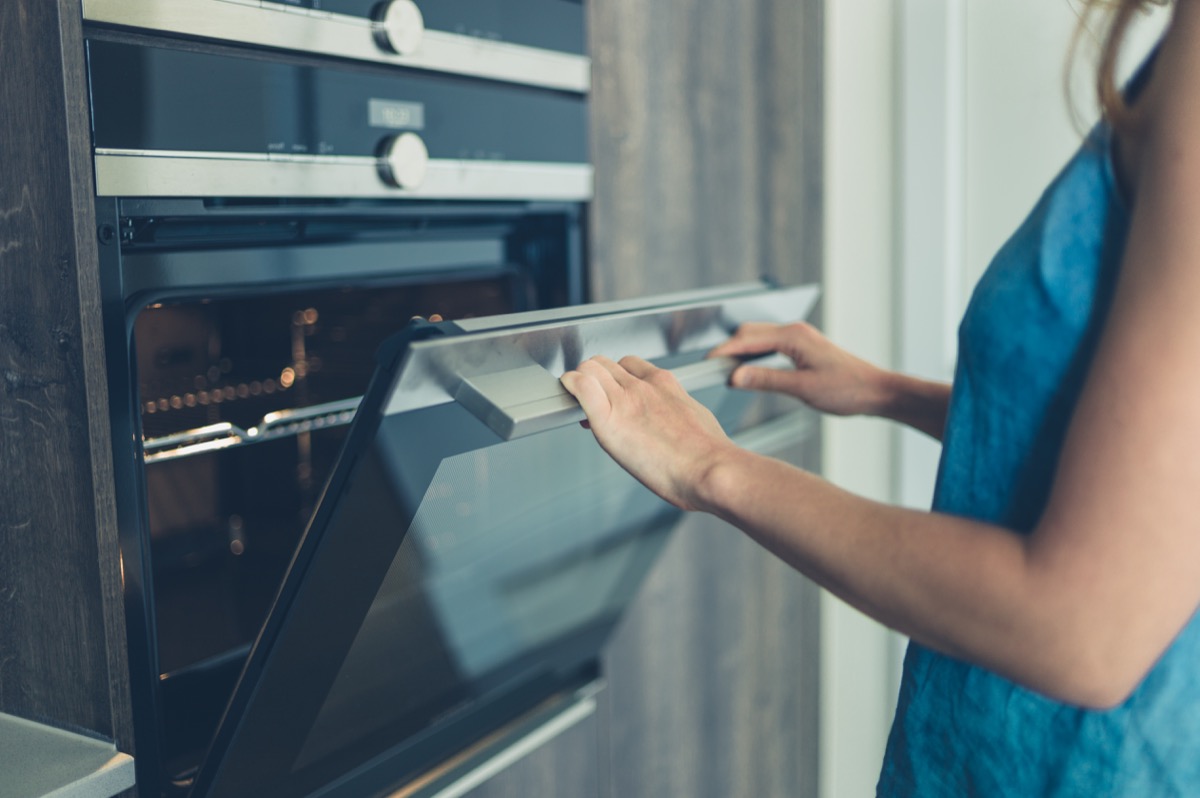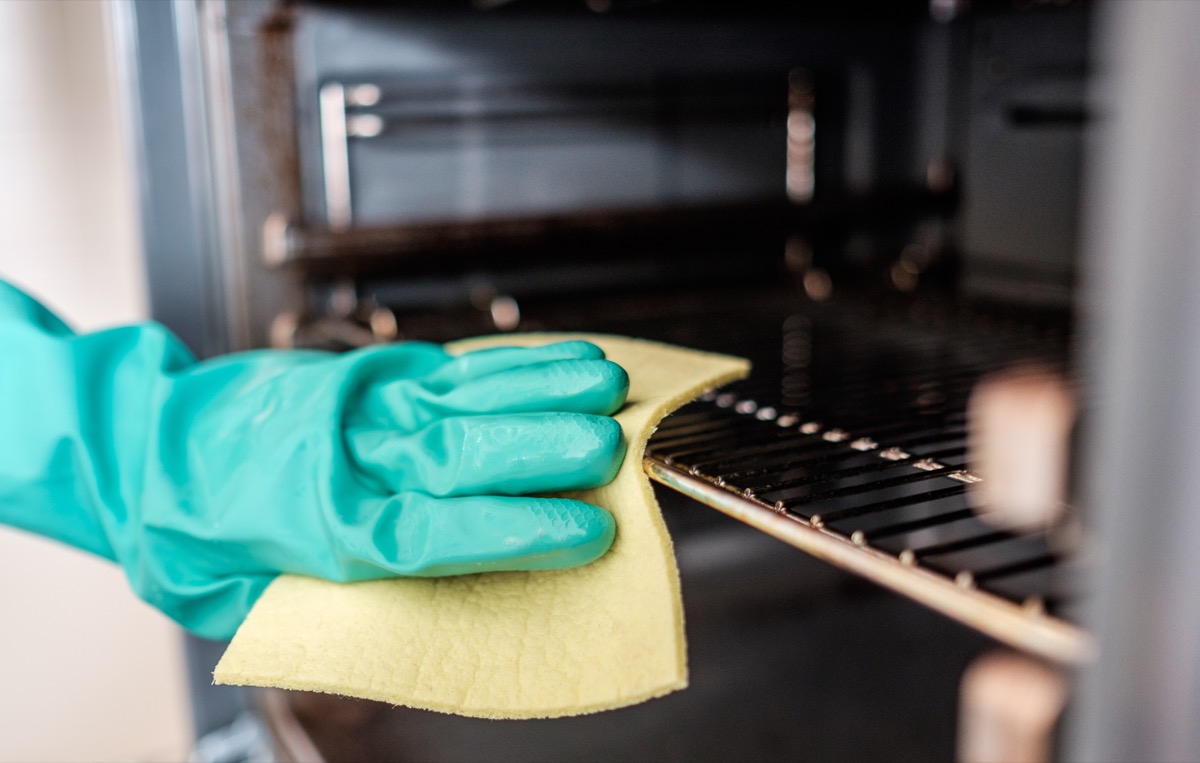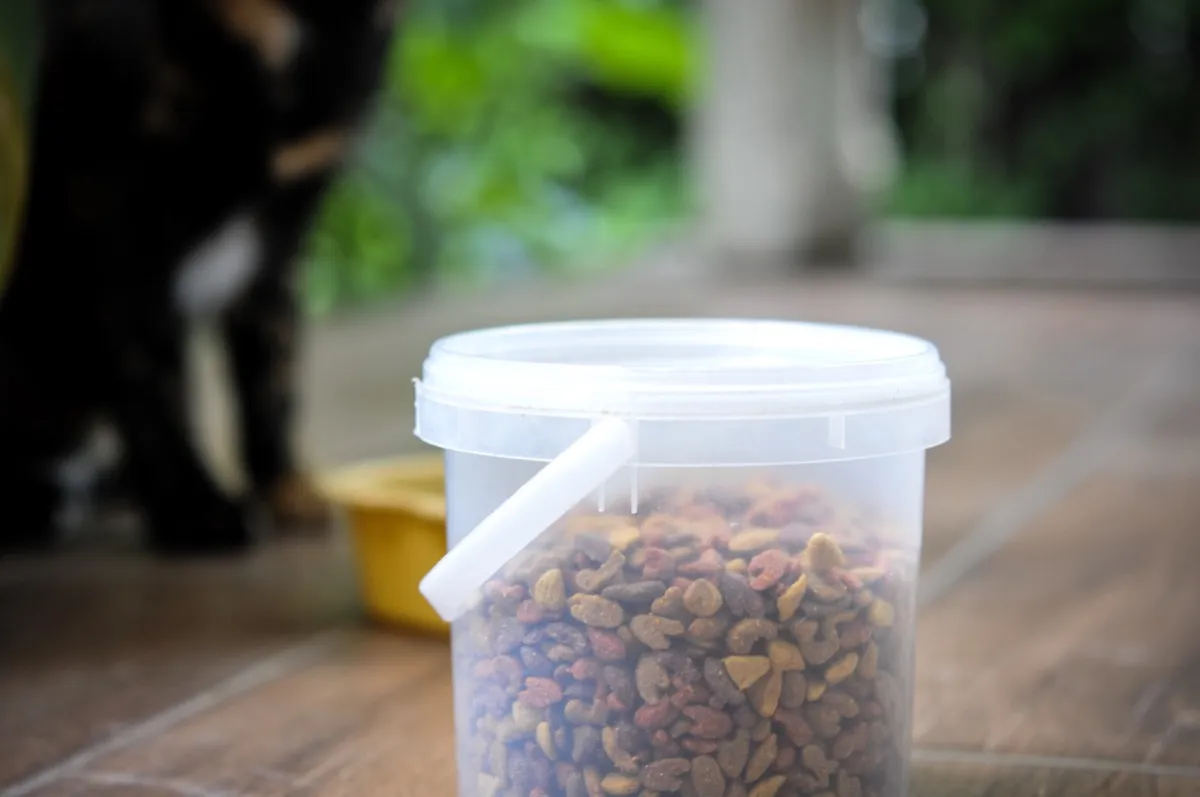Having a mouse in your house is more than just an annoyance—it can also be a health and safety hazard. This is especially true when rodents congregate in your kitchen and contaminate your food and water sources by making them their own.
Mice frequently spread bacteria and viral disease by leaving waste on your countertops, in cupboards, and inside appliances. In particular, they're known to nest behind refrigerators or even inside ovens.
However, given that mice are usually experts at staying out of sight, you may not notice a problem until you've got a full-blown infestation. Thankfully, there's one thing that might tip you off to the presence of mice hiding in your stove—and counterintuitively, this sign of an infestation smells not unlike a common cleaning product. Read on to find out which smell suggests you have mice, and what you can do to reclaim your kitchen.
RELATED: 6 Things in Your Yard That Are Bringing Mice to Your Home.

While some people use ammonia to clean their ovens, others notice the smell in the kitchen appliance for a very different reason. If the pungent aroma appears when you crank your oven's heat, it most likely means you have a mouse problem inside.
"The presence of mice may give off an ammonia-like smell, which is a very strong urine smell. This will be particularly obvious in more enclosed areas such as in cupboards or ovens," Nancy Troyano, PhD, a board-certified entomologist with Ehrlich Pest Control, tells Best Life.
Matthew Mills, COO and president of the green pest manufacturer Med-X, adds that mice are drawn to ovens for their insulation. "They like to nest in the insulation, and what's worse, they remove the insulation from the oven and take it into the walls for nesting," he notes.
RELATED: If You Live in These States, Prepare for a Rat Infestation, Experts Warn.

According to the Centers for Disease Control and Prevention (CDC), having mice in the home can put you at risk of serious illness. Perhaps most commonly, mice are known to spread hantavirus, a group of viruses that can cause fever, muscle aches, fatigue. "After a few days [hantavirus patients] will have a hard time breathing. Sometimes people will have headaches, dizziness, chills, nausea, vomiting, diarrhea, and stomach pain," the CDC explains.
According to the health authority, hantavirus is most commonly spread "when rodent urine and droppings that contain a hantavirus are stirred up into the air. People can also become infected when they touch mouse or rat urine, droppings, or nesting materials that contain the virus and then touch their eyes, nose, or mouth," explains the CDC.
Additionally, mice are known to spread a range of other diseases, including Lassa fever, leptospirosis, salmonellosis, plague, and more. It's important not to have direct contact with their excrement, and to avoid breathing near their urine and droppings.

While ridding your home of mouse droppings and urine is important for your safety, you may actually be at highest risk of illness while doing just that. For this reason, the CDC advises taking serious precautions when cleaning up after mice. They recommend spraying the infected areas with a mixture of water and bleach, then leaving it to soak for five minutes. While wearing rubber gloves, wipe up the urine and droppings with a paper towel, then re-spray the area with a disinfectant. Finally, remove and disinfect your gloves if you plan to reuse them in the future, and be sure to thoroughly wash your hands.
The CDC warns that you should never sweep or vacuum mouse urine, droppings, or nests. "This will cause virus particles to go into the air, where they can be breathed in," the organization says. Consider wearing a mask while cleaning any enclosed areas, including your oven.
For more home safety tips sent directly to your inbox, sign up for our daily newsletter.

The best way to avoid becoming sick from mice is to keep them out of your home in the first place. However, keeping your home mouse-free can be particularly challenging at this time of year, says Troyano. "Mice are adaptable and they are relentless in their search for food, warmth, and shelter—and your home can support all of their basic needs. In the fall and winter, these needs become more acute, hence their desire to get inside," Troyano explains.
Besides setting traps to curb serious infestations, experts recommend also making your home—and especially your kitchen—less hospitable to rodents. You can do this by keeping your counters and cupboards free of accessible food sources. This means storing food items in glass, plastic, or metal containers with tight lids. Seal off your garbage cans, and be sure to put away your pet's food and water bowls at night time. And of course, clean your oven and stove regularly to rid the appliance of any excess morsels of food.
Eliminating entry points can also reduce your risk of mice in the home. "Fit brush strips to the bottom of doors to prevent entry, fix damaged roofing and use wire mesh to seal gaps, check that any old pipe holes are sealed, and cover vents with fine galvanized wire mesh—especially if they are damaged," suggests Troyano.
RELATED: If You're Not Cleaning This, You're Inviting Mice Into Your Home.
"smell" - Google News
November 07, 2021 at 07:34PM
https://ift.tt/3kz4n5t
If Your Home Smells Like This Cleaning Product, You May Have Mice in Your Stove - Best Life
"smell" - Google News
https://ift.tt/35zrwu1
https://ift.tt/3b8aPsv
Bagikan Berita Ini

















0 Response to "If Your Home Smells Like This Cleaning Product, You May Have Mice in Your Stove - Best Life"
Post a Comment